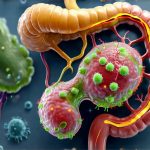The gut – often referred to as our “second brain” – is far more than just a digestive system. It’s a complex ecosystem teeming with trillions of microorganisms, collectively known as the gut microbiota, that profoundly impacts everything from immunity and mental health to nutrient absorption and energy levels. Many people experience discomfort stemming from imbalances within this ecosystem, manifesting as bloating, constipation, diarrhea, or even chronic conditions like Irritable Bowel Syndrome (IBS). Often, these issues aren’t due to serious disease but rather lifestyle factors contributing to poor gut motility (the speed at which food moves through the digestive tract) and a disrupted microbial balance. Understanding how daily habits influence this intricate system is the first step towards improved digestive health and overall wellbeing.
It’s important to remember that everyone’s gut is unique, shaped by genetics, diet, environment, and lifestyle. What works wonders for one person may not have the same effect on another. This article focuses on generally beneficial tweaks – small, manageable changes you can implement into your daily routine – aimed at promoting healthy gut motility, fostering a diverse microbiome, and ultimately enhancing digestive comfort. We’ll explore practical strategies that are accessible to most people and emphasize the importance of listening to your body and adjusting approaches as needed. This is about building sustainable habits for long-term gut health, not quick fixes or restrictive diets. You can begin with daily rituals to support your overall wellbeing.
Dietary Foundations For Gut Health
Diet forms the cornerstone of gut health. What we consume directly fuels both our bodies and the trillions of microbes residing within us. A diet lacking in fiber and rich in processed foods can severely compromise gut motility and contribute to microbial imbalances – often favoring harmful bacteria over beneficial ones. Conversely, a diverse diet abundant in plant-based foods provides the necessary “food” for a thriving microbiome. This means prioritizing whole, unprocessed foods as much as possible.
Focusing on prebiotics and probiotics is crucial. Prebiotics are essentially food for probiotics – they’re types of fiber that your gut bacteria ferment, producing beneficial compounds like short-chain fatty acids (SCFAs), which have anti-inflammatory properties and support overall gut health. Excellent sources include garlic, onions, leeks, asparagus, bananas, oats, and apples. Probiotics, on the other hand, are live microorganisms found in fermented foods like yogurt, kefir, sauerkraut, kimchi, kombucha, and miso. Incorporating these into your diet can help repopulate the gut with beneficial bacteria. However, remember that probiotic supplements aren’t always necessary; a food-first approach is generally preferred. Meal timing can also play a role in improving stomach comfort.
Beyond prebiotics and probiotics, adequate hydration is paramount for optimal gut motility. Water helps soften stool, making it easier to pass through the digestive tract, preventing constipation and promoting regular bowel movements. Aim for at least eight glasses of water per day, adjusting based on your activity level and climate. Finally, pay attention to food sensitivities or intolerances. Undiagnosed food sensitivities can cause inflammation in the gut, disrupting microbial balance and leading to discomfort. Consider an elimination diet under the guidance of a healthcare professional if you suspect certain foods are triggering symptoms. Gut acidity is also important for nutrient absorption.
The Role of Fiber
Fiber is undeniably one of the most important dietary components for gut health. It’s not just about preventing constipation; different types of fiber offer distinct benefits. Soluble fiber dissolves in water, forming a gel-like substance that slows digestion and helps regulate blood sugar levels. Sources include oats, beans, apples, and citrus fruits. Insoluble fiber, on the other hand, adds bulk to stool and promotes faster transit time through the digestive tract. Found in whole grains, vegetables, and wheat bran, it’s essential for preventing constipation.
- Gradually increase your fiber intake: Adding too much fiber too quickly can actually cause bloating and discomfort. Start slowly and gradually increase over several weeks to allow your gut microbiome to adapt.
- Aim for a variety of fiber sources: Combining both soluble and insoluble fiber provides the most comprehensive benefits for gut health.
- Listen to your body: Pay attention to how different types of fiber affect you and adjust accordingly.
The recommended daily intake of fiber is around 25-30 grams, but many people fall short of this amount. Focusing on incorporating more whole foods into your diet – fruits, vegetables, whole grains, legumes, nuts, and seeds – is the most effective way to boost your fiber intake naturally. Remember that processed foods often strip away much of their natural fiber content, so prioritize minimally processed options whenever possible. You can also explore breakfast options to kickstart your day with a fiber boost.
Mindful Eating Practices
Beyond what we eat, how we eat significantly impacts digestion. Rushing through meals without proper chewing can overwhelm the digestive system and lead to incomplete breakdown of food, causing bloating, gas, and discomfort. Practicing mindful eating – paying attention to your body’s hunger cues and savoring each bite – can improve digestion and enhance nutrient absorption.
Here’s how to cultivate mindful eating habits:
1. Eat without distractions: Turn off the TV, put away your phone, and focus solely on your meal.
2. Chew thoroughly: Aim for 20-30 chews per bite to break down food effectively.
3. Slow down: Take breaks between bites and savor the flavors and textures of your food.
4. Listen to your body’s signals: Stop eating when you feel satisfied, not overly full.
Stress also plays a significant role in gut health. When we’re stressed, our bodies release cortisol, which can disrupt digestion, alter gut motility, and negatively impact the microbiome. Incorporating stress-reducing techniques like deep breathing exercises, meditation, yoga, or spending time in nature can help mitigate these effects and promote a calmer digestive system. Childhood favorites can also offer emotional comfort during stressful times.
The Importance of Regular Movement
Physical activity is often overlooked when discussing gut health, but it’s an essential component. Exercise stimulates peristalsis – the wave-like muscle contractions that move food through the digestive tract – improving gut motility and preventing constipation. It also reduces stress levels, which, as we discussed earlier, can negatively impact digestion.
- Aim for at least 30 minutes of moderate-intensity exercise most days of the week: This could include brisk walking, jogging, swimming, cycling, or dancing.
- Incorporate movement throughout your day: Take the stairs instead of the elevator, walk during your lunch break, or do some simple stretches at your desk.
- Consider low-impact exercises like yoga and Pilates: These can help strengthen core muscles, which support digestive function.
Even gentle movements, such as walking after meals, can aid digestion. The key is to find activities you enjoy and incorporate them into your routine consistently. Gut circulation can also be improved through regular movement. Regular physical activity not only benefits your gut health but also contributes to overall wellbeing and a healthier lifestyle.
It’s important to reiterate that improving gut health is a journey, not a destination. Be patient with yourself, experiment with different strategies, and listen to your body’s signals. If you experience persistent digestive issues or have concerns about your gut health, consult with a healthcare professional for personalized guidance and evaluation. Anti-inflammatory foods can also support healing.


















